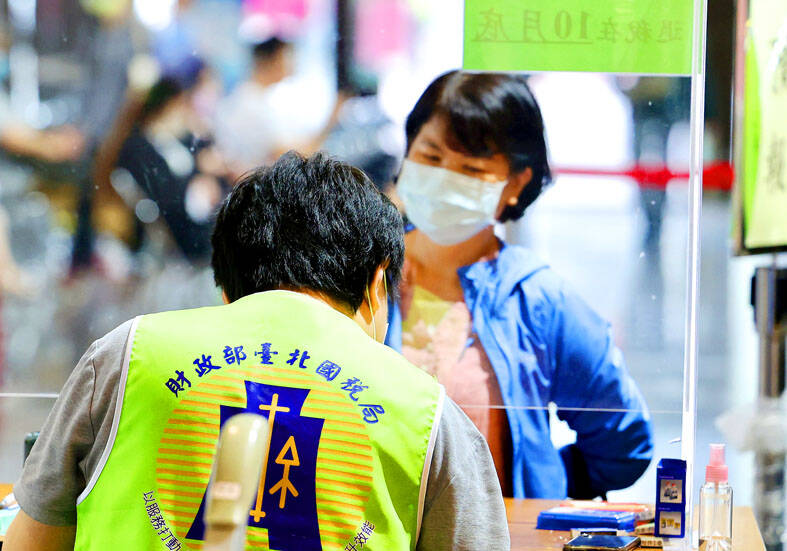The Cabinet next year is to give tax exemptions to low-income young people, families with two children and trigenerational households to relieve economic burdens, Premier Cho Jung-tai (卓榮泰) said yesterday.
He made the comments at a post-Cabinet meeting news conference in Taipei announcing next fiscal year’s general budget.
The government is to increase the maximum allowable sum of income tax reductions, including the cost of living, standard deductions and special deductions, in addition to income bracket adjustments to reduce financial strain, he said.

Photo: CNA
The limit to special deductibles for raising children and rents would also be raised, with the latter being reclassified as a special deduction, Cho said.
The allowance for the basic cost of living is to increase by NT$3,000 (US$98.34), and the maximum sum of deduction allowable for long-term care is increased to NT$180,000, he said.
This means young people living in rented apartments and earning a wage of less than NT$620,000 per year, households with two dependent children earning less than NT$1,641,000 per year, and trigenerational families earning less than NT$2,124,000 per year are fully exempted from paying income tax, he said.
The Legislative Yuan on Thursday last week passed amendments to the Income Tax Act (所得稅法), which are to go into effect when the government collect taxes in May next year.
Meanwhile, the new budget proposal does not include pay adjustments for military personnel, civil servants and public-school teachers for the sake of equality, Cho said.
When the budget is formally submitted, the Executive Yuan would seek constitutional judgements for two pieces of legislation — the Police Personnel Management Act (警察人員人事條例) and Pay Act of the Armed Forces (軍人待遇條例) — and adjust it depending on those results, Cho said.
The government has spared no effort in providing for civil servants and military personnel, Cho said, adding that this year’s supplementary budget already includes funding for military benefits set to increase next year.
In January, the Legislative Yuan passed amendments to the Police Personnel Management Act that raised the monthly income replacement ratio for police, firefighters, coast guard personnel, National Immigration Agency officers and airborne service personnel.
The amendments set the monthly income replacement ratio at 43.25 percent for those in service for 15 years, with the ratio going up by 1.75 percentage points per year until they reach 80 percent at 36 years of service.
In June, lawmakers passed amendments to the Pay Act of the Armed Forces that provide a NT$30,000 monthly allowance for voluntary military service members and higher salaries for those in combat units.
However, the Cabinet did not include the adjustments from the two acts into the budget due to the controversies surrounding them, Cho said.
If necessary, retroactive payments would be issued, Cho added.
There have been three pay raises in four years for military personnel and public servants, accounting for an 11 percent increase altogether, leading some to worry that another pay raise while the government takes on debt would create negative public opinion, people familiar with the matter said.
The slowdown in economic growth, amendments to the Act Governing the Allocation of Government Revenues and Expenditures (財政收支劃分法), US tariffs and a nationwide NT$10,000 cash handout are factors that have been taken into account, Executive Yuan spokeswoman Michelle Lee (李慧芝) said.

Three Taiwanese airlines have prohibited passengers from packing Bluetooth earbuds and their charger cases in checked luggage. EVA Air and Uni Air said that Bluetooth earbuds and charger cases are categorized as portable electronic devices, which should be switched off if they are placed in checked luggage based on international aviation safety regulations. They must not be in standby or sleep mode. However, as charging would continue when earbuds are placed in the charger cases, which would contravene international aviation regulations, their cases must be carried as hand luggage, they said. Tigerair Taiwan said that earbud charger cases are equipped

Foreign travelers entering Taiwan on a short layover via Taiwan Taoyuan International Airport are receiving NT$600 gift vouchers from yesterday, the Tourism Administration said, adding that it hopes the incentive would boost tourism consumption at the airport. The program, which allows travelers holding non-Taiwan passports who enter the country during a layover of up to 24 hours to claim a voucher, aims to promote attractions at the airport, the agency said in a statement on Friday. To participate, travelers must sign up on the campaign Web site, the agency said. They can then present their passport and boarding pass for their connecting international

Temperatures in northern Taiwan are forecast to reach as high as 30°C today, as an ongoing northeasterly seasonal wind system weakens, the Central Weather Administration (CWA) said. CWA forecaster Tseng Chao-cheng (曾昭誠) said yesterday that with the seasonal wind system weakening, warmer easterly winds would boost the temperature today. Daytime temperatures in northern Taiwan and Yilan County are expected to range from 28°C to 30°C today, up about 3°C from yesterday, Tseng said. According to the CWA, temperature highs in central and southern Taiwan could stay stable. However, the weather is expected to turn cooler starting tonight as the northeasterly wind system strengthens again

Taiwan sweltered through its hottest October on record, the Central Weather Administration (CWA) said yesterday, the latest in a string of global temperature records. The main island endured its highest average temperature since 1950, CWA forecaster Liu Pei-teng said. Temperatures the world over have soared in recent years as human-induced climate change contributes to ever more erratic weather patterns. Taiwan’s average temperature was 27.381°C as of Thursday, Liu said. Liu said the average could slip 0.1°C by the end of yesterday, but it would still be higher than the previous record of 27.009°C in 2016. "The temperature only started lowering around Oct. 18 or 19